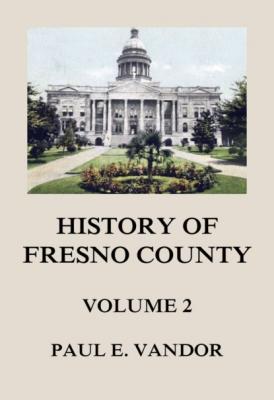ТОП просматриваемых книг сайта:
History of Fresno County, Vol. 2. Paul E. Vandor
Читать онлайн.Название History of Fresno County, Vol. 2
Год выпуска 0
isbn 9783849658991
Автор произведения Paul E. Vandor
Жанр Документальная литература
Издательство Bookwire
Evans-Sontag Reign of Terror
The years 1891-94 have to do with the lurid chapter of the crimes of the Evans-Sontag train robber bandits, their pursuit, bloody and murderous resistance when driven at various times to bay, their final capture and the trials in Fresno. The details are given in another chapter. Chris Evans and John Contant (Sontag) were indicted November 22, 1892, for murder and Evans after a November and December trial of seventeen days was found guilty in 1893 and February 20, 1894, was sentenced to life imprisonment at Folsom. The operations of the gang in California began with the train hold up in February, 1889, south of Pixley in Tulare County. Contant died at the county jail in Fresno from the wounds received when he and Evans were captured after a battle. One Clark Moore indicted as an accessory after the fact on December 2, 1892, was tried on the second of three such charges March 14, 1892, and acquitted. The other charges were afterward dismissed. The newspapers at the time were full of the exploits of the bandit gang, sent special correspondents into the field to tell of the many efforts to capture it, the man hunts, pursuits, final capture and the trials, centering all these activities in Fresno and giving it unenviable notoriety for crime, criminals and the head-hunters fattening on the business of pursuing marked and proscribed men to capture them for rewards, dead or alive. The exploits of the gang were retold with renewal of the various applications of Evans for parole. One of these applications in January, 1908, inspired an "appreciation" of the bandit by Joaquin Miller, "the Poet of the Sierras," having at least curious interest if nothing else. It was published in the Pacific Monthly in the course of an article on famous bandits of the early and later days in California. In this "appreciation" at a time when Evans had served thirteen years of his life sentence, Miller made the point that Evans had never been tried for a train robbery, affected to believe that it was only the railroad influences that kept the crippled, blinded and dying outlaw in the penitentiary and introduced his subject with the following words:
"And now a few pages about the most famous gun-fighter of all; a well-bred and well-read man; a man with a most bloody record, yet a man who never fired a shot except to defend; so say his hosts of friends."
The publication provoked criticism and indignation in Visalia and those familiar with the unsavory history of Evans in that locality declared the Miller statements to be a tissue of misrepresentations and almost devoid of truth. There was there practically unanimous opposition against the liberation of Evans and the effort of the poet, at best an erratic and theatric personage, was little more than attempt to create sentiment through callous misstatements, unseemly and not calculated to inspire confidence even in Miller's veracity. The Times published in answer to the poet a statement that had been prepared on a previous attempt to secure a parole or pardon giving brief history of the many crimes of Evans, including the wanton killing of five men and the wounding or crippling of nine more, clinched by the recital of Evans' boasts of his crimes while yet at large and pursued, and his threats of death for any and all who would give information of his movements to the officers of the law. Which recalls also that in May, 1908, after his sixteen years and more spent in Folsom penitentiary and crippled with a limp after the desperate attempt to escape in 1893 after one year's confinement under his sentence, George Sontag appeared in Fresno looking for work, seeming to think that if he were given employment as a barkeeper the saloon would lose nothing by the advertisement of his presence. After recovery from the wounds received in the attempted jail break, Sontag came at the request of Wells. Fargo & Company to Fresno to give state's evidence against Evans. His final release from prison was on the authority of the governor.
Wooton Mystery
Celebrated case of mystery was the one that grew out of the unaccounted for disappearance "on or about February 1, 1894," as the lawyers would say, of William Wooton, a well to do farmer of near Kingsburg. Murder prosecution could not be instituted because the first link in the proof was lacking — the corpus delicti — proof of death. Wooton's body never was discovered, although there can never have been moral doubt that he was the victim of foul play and the body disposed of in some unknown manner. In one of the proceedings, legal recognition of death was given in a ruling by Judge M. K. Harris in this language of his written decision: "The disappearance of William Wooton last February, an old man and a highly respected citizen of this county, is darkly mysterious. His habits of life, business methods, and neighborly associations added to his sudden and utter obliteration from the gaze of man

